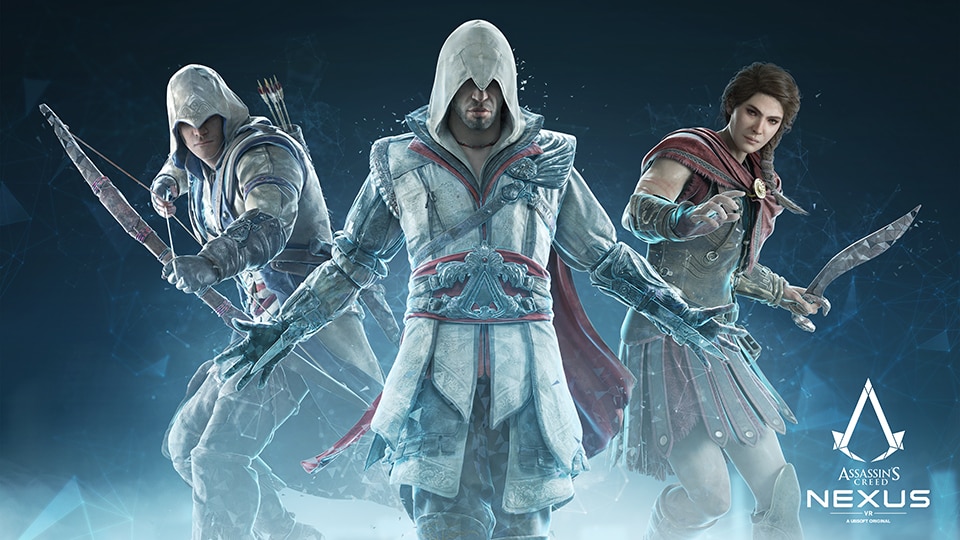Assassin’s Creed Nexus VR, which made its debut during Ubisoft Forward 2023, will let players embody Assassin’s Creed II’s Ezio Auditore da Firenze, Assassin’s Creed III’s Connor, and Assassin’s Creed Odyssey’s Kassandra across an original, centuries-spanning adventure created for virtual reality. Launching this holiday season exclusively for Meta Quest 2, Meta Quest Pro, and Meta Quest 3, Assassin’s Creed Nexus VR aims to immerse players in a true Assassin’s Creed experience where they become the Assassin, including climbing, open environments, parkour, and the Leap of Faith.
To find out more, we spoke with Creative Director David Votypka about what’s in store for Assassin’s Creed Nexus VR, some of the different ways players can approach the game, and how they’ll be able to snap open their own Hidden Blades in VR.
Assassin's Creed is a franchise known for a lot of climbing, fast movement, parkour – does Nexus replicate that in VR? Is it a challenge to do so?
David Votypka: It definitely does. We really made a true Assassin’s Creed game, with climbing, parkour, free running, all of that; that’s been a tenet of all Assassin's Creed games since the very first one. Players can sprint, climb, parkour, run around on the rooftops, and do a Leap of Faith. All of those things exist in the game and are really fun to do.
With that said, players also have the choice of how much they want to engage with those actions. You can do all those things at high speed, you can take it slower, or you can just play on the ground and sneak and use hiding spots. The maps are all open environments to allow the player those types of choices.
How much freedom do players have to choose their own path? Is it a totally open sandbox, or are there linear levels with several intended paths?
DV: It is a core pillar that they're what we call open maps. It's not one big open world like in Assassin’s Creed Odyssey or Valhalla, but it is very explorable. Think of Venice or Boston – in the section of town that you will play in, if you can see it, you can climb it, you can parkour it. You can scale it, traverse it horizontally, vertically, etc. – again, because that's what Assassin’s Creed is, right? And we want to make sure we deliver on that. Most of the objectives in the game are what we call tactical sandboxes, which allow players 360 degrees of freedom in terms of how they approach it. Do they want to sneak in? Do they want to go in fighting, use the rooftops, or stay down on the ground?
I will say that the first couple of missions are more linear, as players learn how to play Assassin’s Creed in VR, but after that – and for the rest of the campaign – it’s all open environments. We felt it was very important to keep this core tenet of the brand intact.
With that openness, is there an ideal way to play? Is it best as a room-scale game or as a seated experience?
DV: You can really play it any way, either room-scale, stationary, standing, or seated. The most immersive or role-play sort of approach to play it is standing, room-scale. You get to feel most like an Assassin in that kind of setup. But at the end of the day, you can play it stationary and use the stick to move around, which you're going to have to do no matter what mode you play it in, because there's a lot of long traversal in the game, going across urban environments. You can also play it seated, which is really important, I think, for VR games to include, because not everybody wants to stand for an hour or two, right? We accommodate all of those things, and I think they're all completely viable ways to play the game.
How do players deploy the Hidden Blade? Is there a motion for it? A button-press?
DV: Bringing Assassin’s Creed – or really any game – to VR, you want to simulate the fantasy of how you would actually do it in real life, right? In real life, you'd flick open your wrist as the blade comes out to get your hand out of the way – which is exactly what you do in the game. You hold the top trigger, and you flick your wrist open with the gesture, and the Hidden Blade deploys.
![[UN][ACM] Ubisoft Forward Nexus Interview - Ezio trail the capo](http://staticctf.ubisoft.com/J3yJr34U2pZ2Ieem48Dwy9uqj5PNUQTn/5m7kxawhUeW9NVvDbaSml0/98ad9f620aa6ddbf05412195956adb00/AC_Nexus_24_EzioTrailTheCapo_960x540.jpg)
It's very much up to the player when they want to deploy it, and that action of deploying it has always been everybody's favorite thing during development. We really wanted to make it a tactile, real-life kind of motion.
What allowances are being made for people who get motion sickness from VR? How much of a consideration is that for the developers?
DV: It's a huge consideration. When I first started talking to people about doing Assassin’s Creed in VR, that was, of course, their number-one question and doubt, honestly: “Could this even work? You want to do parkour in VR? Are you crazy?” But we really were confident that it could work, and we know it does now.
There are certainly players who are comfortable playing in free locomotion with the Leap of Faith, parkour, etc. But there are obviously players who are not going to be comfortable with that, and our goal has been to deliver a true action game, but one that accommodates players of all types of VR sensitivity. We have a team dedicated to nothing but comfort features for the majority of the development of the project, and there's some really great work that they've delivered. For example, we have teleport, which is a standard feature in VR, but ours goes beyond in the sense that it accommodates, first of all, stealth gameplay. We really didn't want teleport to break detection, for example to let players teleport across the street but without enemies noticing you. The system gives you feedback, like an awareness warning, that as you aim your teleport across a guarded street, enemies would see your path. Teleport also applies to climbing and parkour, so you can parkour-teleport. And you can climb-teleport up a wall as well, allowing you to avoid free locomotion.
![[UN][ACM] Ubisoft Forward Nexus Interview - Ropewalking](http://staticctf.ubisoft.com/J3yJr34U2pZ2Ieem48Dwy9uqj5PNUQTn/2bRnhIJQ73uq7fQTfVquyP/486e6c32833838f9de121fca998166f0/AC_Nexus_29_RopeWalking_960x540.jpg)
Additionally, our dynamic vignetting – blacking out the edges of the screen, the peripheral vision – which you saw first in Eagle Flight, and which we've included in the game. It really only vignettes when objects are near, and only in the areas needed, to help with the peripheral vision motion sensitivity.
Also, with Assassin’s Creed you have to consider heights and rooftops and that kind of thing; we have systems to help with fear of heights or vertigo, or those kinds of sensitivities. One feature, for example, is a subliminal grid that gives you a sense of grounding underneath your feet, even if you're standing on the edge of a rooftop. We found that also can really help players. So yes, comfort overall has been a huge focus for us.
Pivoting to the characters, Nexus puts players in the shoes of Ezio, Connor, and Kassandra. Why focus on these three characters specifically?
DV: When we first started talking about what setting we should do for Assassin's Creed in VR, we really liked the idea – because it's the first time AC is in VR – to allow players to rediscover what it's like to play as one of their favorite Assassins, but in a completely new way. Which then led us to thinking: “What if you could play more than one, which has never really been done in AC before?”
So as we rolled down the road on that idea, and liked it more and more, the next question was, which Assassins would be the right choices? Ezio is an obvious one – the most popular assassin, really, of all time in the brand. Kassandra is a close second, though; she's also been really popular from Odyssey. And with Connor, I think it was a little bit more about his setting – colonial America was really a compelling setting in Assassin’s Creed III. Those three together all seem to really deliver strong value for players, and from a nostalgia factor as well, and gave us three really interesting settings to jump around and between.
As you’re saying this, I'm realizing they would also play quite a bit differently. Is that reflected in Nexus?
DV: To some degree, yes. It was a tricky balance, because we didn't want players to feel like they had to learn a new Assassin each time they swapped, and have it be super-different.
So they do share a lot; like, they have two Hidden Blades – except Kassandra, she actually only has one, and this is the first time players will get to play with Kassandra and her Hidden Blade. But they have some different weapons; Ezio has a one-handed crossbow, Connor has a bow, and Kassandra has a special bow, which I won't spoil. They all have throwing knives, Ezio and Kassandra have swords, while Connor has his tomahawk. So there are some differences, but we didn't want to make them so drastic that players felt like they were playing three different games.
![[UN][ACM] Ubisoft Forward Nexus Interview - Kassandra Combat](http://staticctf.ubisoft.com/J3yJr34U2pZ2Ieem48Dwy9uqj5PNUQTn/1OL8vFIQ9Yqr6qOIZjoM9g/613c2e51b4854cd58b97ae369e0150f7/AC_Nexus_37_KassandraCombat_960x540.jpg)
Where in these characters’ stories do the events of Nexus take place? Are these sequels, prequels, or interquels?
DV: Generally speaking, they're later in the lives of these characters. Ezio's story begins around 1509 [two years after the events of Assassin’s Creed Brotherhood], during a time in his life that wasn't really heavily documented in Assassin’s Creed lore previously. So that gave us some freedom to tell the stories of what he was doing then. With Kassandra, it's 20 years after the events of Odyssey, during a real historical period called the Reign of the Thirty Tyrants, when these 30 men brutally ruled Athens.
Connor's is intermingled with the events of Assassin’s Creed III. It happens in 1776 and 1777, so it's additional stories of what was going on with him at that time.
Do these stories have a common thread, or are they three separate adventures?
DV: I suppose the answer is both; they're historically separate, because all these Assassins lived in very different time periods, but it's the modern-day story that ties them together.
Essentially, players are trying to solve a mystery across time, and they're exploring multiple settings through these three different Assassins in order to solve it.
It’s rare that Assassin’s Creed characters get sequel stories. Do you feel a sense of weight or responsibility in working with these characters?
DV: It is a huge sense of responsibility, not only within Ubisoft, but also for the players and Assassin’s Creed fans who’ve loved these characters for a long time. We wanted to make sure that we delivered not only on their stories, but their performances, and that they all feel, look, and sound like they did – especially because you're stepping into their boots, and you are speaking as Ezio. It's even more impactful that way.
![[UN][ACM] Ubisoft Forward Nexus Interview - Ezio Sword and Knife](http://staticctf.ubisoft.com/J3yJr34U2pZ2Ieem48Dwy9uqj5PNUQTn/1zJGgIoUBPm4JAVAL7ehqa/ce567649d90bcb1950019d249c43aed2/AC_Nexus_34_EzioSwordAndKnife_960x540.jpg)
What about working in virtual reality do you find most exciting or interesting?
DV: For me, my passion for VR goes back to the ’90s, when I first heard about it. I wanted to make games, and the idea of immersive gaming really struck me. I think the reason is, it can be really the most immersive form of entertainment that we've ever known. I like to describe it as VR allows us to go places and become people and do things that we otherwise could not do. So that immersion, escapism – or perhaps a better word is transcendence – is what I really love about VR.
In this case, it allows us to step into the boots of these characters and actually become a Master Assassin. I also like to make clear that we're not creating a small VR experience with a little bit of Assassin's Creed sprinkled on top; we're creating a proper Assassin’s Creed game that maximizes the use of VR to immerse the player into becoming a Master Assassin more deeply than ever before.
Assassin’s Creed Nexus VR will launch this holiday season for Meta Quest 2, Meta Quest Pro, and Meta Quest 3. For more updates on Assassin’s Creed and other announcements at Ubisoft Forward 2023, stay tuned to Ubisoft News.







